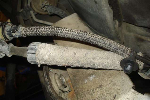Having almost completed a top end rebuild on my truck with my old man, here are some of my thoughts.
Like previously mentioned a heavier weight oil should not improve torque, unless there is a situation of a damaged or stuck ring, which can be found through both leak down and compression tests. And if a stuck ring is suspected, adding a little oil to the combustion chamber through the spark plug hole can help to improve that and can bring the compression back up to an acceptable level and hopefully provide some relief for that. Torque is a direct product of a combustion engines ability to turn freely after spark ignites fuel. Thinner oil allows these parts within the engine to move more freely, providing adequate lubrication for the tighter tolerances on these engines (hence improving the mileage as the engine isn't working as hard and will actually IMPROVE TORQUE). All things already stated.
Whether or not heavier weight oil will increase wear though is tough to determine. I've run 5/20, 5/30, and 10/40 in mine and when we finally tore it down to do the head gaskets the oil had just been changed less than 500 miles prior with 10/40 and a Valvoline filter. Remember also, these heads have no cam bearings, so a thinner oil will certainly help there.
Here is a photo of the drivers cylinder head at teardown. This is the head opposite the head that was suspected of the leak (passenger head). Passenger head was as clean as anything, likely from the coolant vapors cleansing it. Some of this sludge may be due to the engine overheating. Whether or not the thicker oil contributed to this sludge condition, I guess it's entirely possible but not likely that it contributed to the failure of the parts, but had it continue to be run like this, total failure may have resulted.















